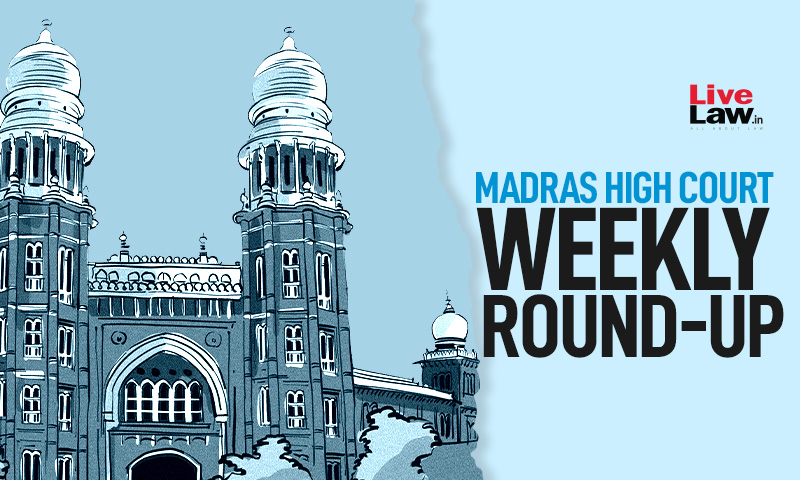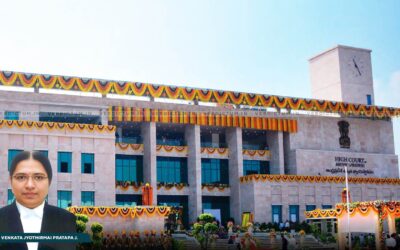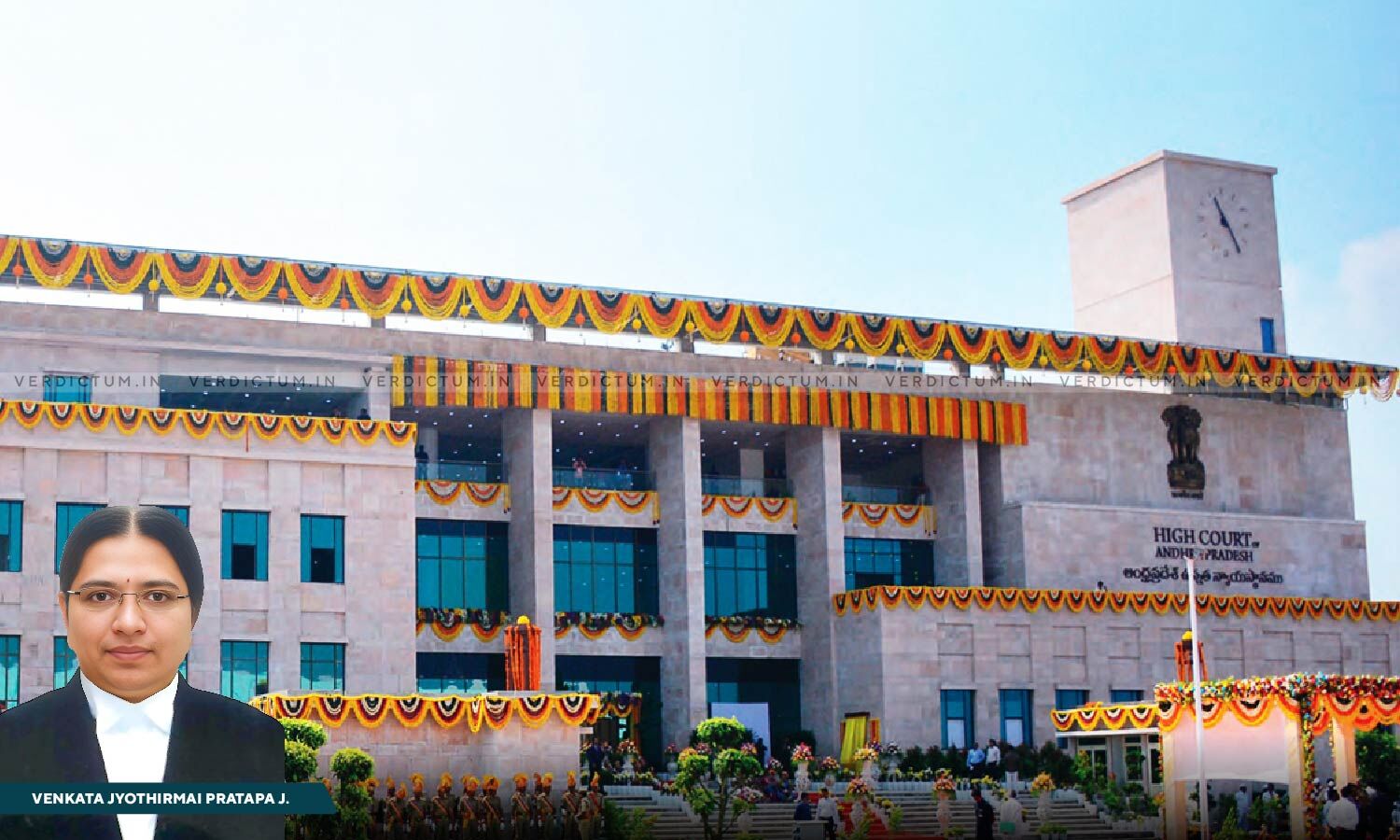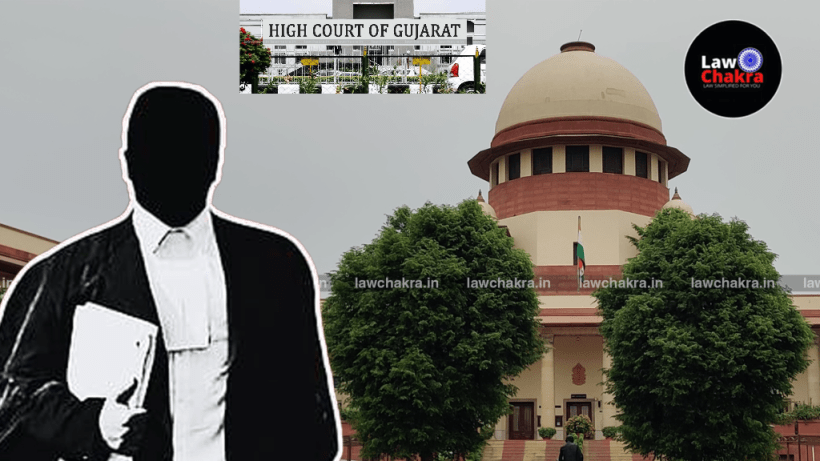Madras High Court Weekly Round-Up: June 16


NOMINAL INDEX
Jaganmoorthy v Inspector of Police, 2025 LiveLaw (Mad) 201
Muruganandam and Another v. State, 2025 LiveLaw (Mad) 202
ABC v. XYZ, 2025 LiveLaw (Mad) 203
Vetri Maaran v. The Chairman, CBFC and Another, 2025 LiveLaw (Mad) 204
R Jim v. The Secretary, Bar Council of Tamil Nadu & Puducherry, 2025 LiveLaw (Mad) 205
Madurai Multi Functional Complex Private Limited v. the Madurai Corporation, 2025 LiveLaw (Mad) 206
The Executive Secretary of District and Others v. K.S Subha Karuthukhan, 2025 LiveLaw (Mad) 207
Akash Baskaran v. The Joint Director, 2025 LiveLaw (Mad) 208
Sakthivel Ganesan v. Inspector of Police, 2025 LiveLaw (Mad) 209
J Revathy v The Government of India and Others, 2025 LiveLaw (Mad) 210
M Arasupandi v. The Commissioner of Police and Others, 2025 LiveLaw (Mad) 211
REPORT
Case Title: Jaganmoorthy v Inspector of Police
Citation: 2025 LiveLaw (Mad) 201
The Madras High Court has ordered the Tamil Nadu police to arrest Additional Director General of Police HM Jayaram to investigate his alleged involvement in an abduction case. The judge has also asked KV Kuppam MLA “Poovai” Jagan Moorthy to cooperate with the investigating authorities.
Justice P Velmurugan directed the police to take action against the ADGP as per law. The court added that being a public servant, Jayaram was answerable to the public. The judge added that a strong message should go out to the public that no one was above law.
Case Title: Muruganandam and Another v. State
Citation: 2025 LiveLaw (Mad) 202
The Madras High Court recently criticised the Tamil Nadu police for trying to suppress dissent by registering criminal cases against individuals who were peacefully protesting against issues that affected public health and social welfare.
The court thus quashed criminal proceedings against individuals who had participated in protests against the functioning of a TASMAC outlet in a populated area.
Justice P Velmurugan also remarked that if criminal cases were registered against every citizen who participates in peaceful protests, it would amount to criminalisation of democratic expression. The court thus added that the case showed how the criminal justice system was being wrongly used against people who were working for the welfare of the community.
Case Title: ABC v. XYZ
Citation: 2025 LiveLaw (Mad) 203
While granting divorce to a husband, the Madras High Court recently observed that making unsubstantiated sexual allegations against husband and father-in-law amounts to defamation which in turn constitutes mental cruelty.
The bench of Justice J Nisha Banu and Justice R Sakthivel held as under,
“As elaborated above, the unestablished sexual allegations made by the respondent against the petitioner and his father, amounts to cruelty and thus, the petitioner has made out a case under Section 13 (1) (i-a) of H.M. Act. Points for consideration arising in these Civil Miscellaneous Appeals are answered accordingly. The petitioner is thus entitled to a Decree of divorce,” the court said.
The court thus noted that though the wife was willing to resume the marital life, considering the mental cruelty that was inflicted by her upon the husband, the husband’s unwillingness to reunite was justified. Noting that the parties could not reach a consensus even during mediation, the court was inclined to allow the husband’s appeal and dissolve the marriage.
Case Title: Vetri Maaran v. The Chairman, CBFC and Another
Citation: 2025 LiveLaw (Mad) 204
The Madras High Court on Tuesday disposed of a plea filed by director Vetri Maaran challenging the CBFC’s refusal to certify the upcoming Tamil movie “Manushi”, produced by Maaran, without specifying the objectionable content.
The CBFC informed Justice N Anand Venkatesh that as per the previous order of the court, the reviewing board had watched the movie again and had provided the details of the portions/dialogues/scenes from the movie, to which it had objections. The Board also informed the court that it was willing to consider certifying the movie, if it is submitted afresh, after removing the objectionable content.
At the same time, Advocate Subash, appearing for Vetri Maaran, informed the court that he had objections with respect to the objectionable portions of the film, pointed out by the board. Since such objections could not be gone into in the present plea, the court gave liberty to Maaran to challenge the same in the manner known to law.
Case Title: R Jim v. The Secretary, Bar Council of Tamil Nadu & Puducherry
Citation: 2025 LiveLaw (Mad) 205
The Madras High Court recently criticised the frequent boycott of courts by lawyer bodies over “flimsy” grounds or based on certain individual grievances. The court said that such practice must not be appreciated. The court observed that in case of grievances, the lawyers should approach the Bar Council or competent authorities and not resort to a boycott unnecessarily.
The bench of Justice SM Subramaniam and Justice AD Maria Clete noted that the Supreme Court has also deprecated frequent court boycott by lawyers and had reiterated that the lawyers should resolve their grievances by approaching competent authorities. The bench observed that lawyers were stakeholders in the justice delivery system and their absence would affect court proceedings. The court also added that boycott by lawyers was a concern to judiciary and in such cases, the court would not be in a position to dispose of the cases.
Case Title: Madurai Multi Functional Complex Private Limited v. the Madurai Corporation
Citation: 2025 LiveLaw (Mad) 206
The Madras High Court recently observed that the property belonging to the Union will be exempt from any tax imposed by the State as per Article 285(1) of the Constitution, even if it is put to commercial use.
The bench of Justice GR Swaminathan and Justice M Jothiraman noted that Article 285 of the Constitution did not specify the kind of property that was exempt, and thus, the expression would have to be understood in an absolute sense. The court thus observed that property would mean any property, whether vacant or constructed or used for public interest or for commercial purposes. The court thus highlighted that all kinds of property belonging to the Union Government would take shelter within the Article, which stood like an Iron dome.
Case Title: The Executive Secretary of District and Others v. K.S Subha Karuthukhan
Citation: 2025 LiveLaw (Mad) 207
The Madras High Court recently observed that a matrimonial dispute was treated as a misconduct under the Tamil Nadu Government Servants’ Conduct Rules, 1973, and the Government departments were empowered to initiate action such misconduct.
The bench of Justice SM Subramaniam and Justice AD Maria Clete noted that a public servant was expected to maintain honesty, integrity and good conduct not just inside the office but outside as well. Thus, the bench held that even if a misconduct was committed in a matrimonial relationship, the department could initiate disciplinary proceedings.
Case Title: Akash Baskaran v. The Joint Director
Citation: 2025 LiveLaw (Mad) 208
The Madras High Court has stayed all proceedings initiated by the Enforcement Directorate against film producer Akash Bhaskaran and businessman Vikram Ravindran. The court also directed ED to return all materials seized from the petitioners.
The bench of Justice MS Ramesh and Justice V Lakshminarayan held that the authorisation based on which the ED had conducted searches at the offices and residences of the petitioners was prima facie without jurisdiction since there was no incriminating material against them. The court also observed that the materials produced by the ED had no semblance of any information based on which the ED had decided to take action against the petitioners.
Case Title: Sakthivel Ganesan v. Inspector of Police
Citation: 2025 LiveLaw (Mad) 209
The Madras High Court has informed the Director General of Police and the Commissioner of Police, Greater Chennai that it will take stringent action by way of suo motu contempt proceedings against the police department if it is found that the name of victims in sexual offence cases is revealed in the FIRs.
Justice P Velmurugan asked the DGP and the Commissioner to give instructions to all investigating officers that in case of certain offences, the identity of the victim/child should not be revealed as enunciated under law and through the directions of the Supreme Court.
The court noted that as per the directions of the Supreme Court, the indemnity of victims of rape and sexual offences should not be revealed in any form. The court however noted that some investigating officers were not following these directions nor the law which prohibited the same.
Wife Doesn’t Need Husband’s Permission To Apply For Passport: Madras High Court
Case Title: J Revathy v The Government of India and Others
Citation: 2025 LiveLaw (Mad) 210
The Madras High Court has made it clear that is not necessary for a wife to get her husband’s permission and his signature while applying for a passport. The court added that such a practice does not augur well for a society that is moving towards women’s emancipation and was a kind of male supremacism.
Expressing shock at the authority’s insistence, Justice Anand Venkatesh observed that insistence by the Passport Authorities showed the mindset of the society, which treated women like a chattel and as belonging to the husband after marriage. The court added that the woman does not lose her individuality after marriage and can always apply for a passport without the permission or signature of her husband.
Case Title: M Arasupandi v. The Commissioner of Police and Others
Citation: 2025 LiveLaw (Mad) 211
The Madras High Court recently modified a condition imposed in the conduct of the Murugan Conference of Madurai, mandating that all vehicles coming for the conference obtain a pass to enter Madurai.
The bench of Justice GR Swaminathan and Justice K Rajasekar held that the Assistant Commissioner could not have passed such a blanket prohibitory order as the officer did not have control over the entire city. The court also noted that there was no strong reason to interfere with the fundamental right of the citizens.
The court further noted that in the present case, nothing had been shown by the officials in support of the conditions. The court added that the authorities had failed to specify the problems anticipated by them for imposing the conditions. The court also noted that in a republican democracy like ours, the ease of participation in democratic gatherings is equally vital.
OTHER DEVELOPMENTS
The Madras Bar Association has condemned the act of the Enforcement Directorate in issuing a notice to Senior Advocate Arvind Datar in connection with a legal opinion rendered by him.
The association highlighted that time and again, the Supreme Court has held that advocates are not liable for the alleged acts of their clients. It also added that if advocates are subjected to coercive measures for their legal opinion, it would paralise the legal system.
Don’t Have Power To Seal Premises If Locked During Search: ED Admits Before Madras High Court
The Enforcement Directorate, on Tuesday, admitted before the Madras High Court that it did not have power to seal premises if the same was locked at the time of making a search as per Section 17 of the Prevention of Money Laundering Act.
The bench of Justice MS Ramesh and Justice V Lakshminarayan was hearing petitions filed by film producer Akash Bhaskaran and businessman Vikram Ravindran against the ED’s search conducted at their residence and office and to declare the same as illegal. It was alleged that the ED had sealed the residential flat and the office since it was locked at the time of search.
During the hearing, the judges wondered if ED had the power to seal the premises, and questioned as to which provision allowed the ED to seal.To this, ASG SV Raju admitted that ED did not have such powers. Raju further submitted that as per Section 17 of PMLA, the ED had the power to break open a locked premise’s seal. He added that the ED did not take such action in the present case since it did not want to escalate the situation.
Case Title: High Court of Madras v. Siva Das Meena IAS and Another
Case No: Cont P 1825 of 2025
The Madras High Court has directed IAS Officer Siva Das Meena (Chief Secretary to TN Government from 19, September 2023 to 19, August 2024) and the current Chief Secretary to TN Government, N Muruganandam to appear before the court and explain why previous order of the court was not complied with in due time.
Justice Battu Devanand issued statutory notices to the two officers in a suo motu contempt case initiated by it in April 2025. The suo motu contempt case was initiated after the court noted that the State had not complied with an order passed by the court in 2023. In the 2023 order, the court had directed the Chief Secretary to constitute a committee to make necessary recommendations to amend the Tamil Nadu Civil Service (Appointment on Compassionate Grounds) Rules, 2023 and to take steps to obtain report from the committee within 2 months.
Case Title: K Vimal Vimalavelan v. Naveen Babu Ghanta @ Nani and Others
Case No: OA No 612 of 2025 in CS (Comm Div) No. 153 of 2025
The Madras High Court has issued notice on a script writer’s plea alleging that the recent movie starring Nani is an unauthorised adaptation of his story.
Justice Senthilkumar Ramamoorthy issued notice returnable by July 7, 2025, and adjourned the plea.
The notices were ordered on a petition filed by Vimal @ Vimalavelan, who was a script writer and an author. Vimal had sought a declaration that the movie “HIT: The Third Case (HIT 3) was an adaptation of his registered script and to permanently restrain the respondents from assigning any further rights of the movie and from committing any further acts of infringement.




